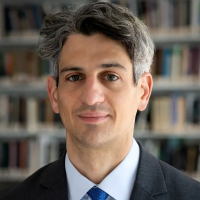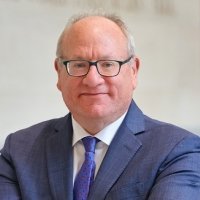Kennan Long View Series | Russian Grand Strategy: Reality and Rhetoric
“Russian Grand Strategy: Reality and Rhetoric” was an in-depth discussion of the August 2021 report issued by the Rand Corporation and authored by Samuel Charap, Dara Massicot and others. Understanding Russia’s grand strategy can help U.S. decisionmakers both avoid strategic surprise by anticipating Moscow’s actions and reactions and assess the depth and nature of potential conflicts between Russia and the United States. The authors of this report review Russia’s declared grand strategy, evaluate the extent to which Russian behavior is consistent with stated strategy, and outline implications for the United States. The discussants were Samuel Charap, Senior Political Scientist, and Dara Massicot, Senior Policy Researcher, both of the RAND Corporation. It was moderated by Michael Kimmage, of the Kennan Institute and of the Catholic University of America.
Selected Quotes
Dara Massicot
“Russia’s official military strategy focuses on something called non contact warfare… it is a form of warfare that the United States has perfected, it's a long range missile precision strike, it is different types of taking down networks… destabilization behind enemy lines. What it is not, and what Russia specifically states in its strategy is that a large-scale World War II force style of clash is increasingly unlikely in the 21st century, and further that the aerospace domain will be the center of gravity moving forward modern warfare.”
“In readiness, even though Russia has made great strides, there are still persistent issues with equipment serviceability, manning is also an issue both from some aspects to undermanning to their mixed manning system that makes it very difficult to project forces abroad for this purpose if not everybody is highly trained or if you are a construct. And then sustainability, Russia does not have that network of forward bases any more, they don’t have logistics that they have already made to support these things. They have been making efforts in Africa and other places but for some reason it is not sticking, they can’t seem to get it over the line, and they don’t really have a modular force structure.”
“We have run across the point of view that the Russian grand strategy is not really what they were doing, and they have this shadow strategy, and their strategy documents have reflexive control… and we didn’t find that empirically to be the case… Even though there are some things they traditionally do in the shadows like disinformation campaigns, or some of their operatives abroad, all of those things can be essentially in service to goals articulated in the strategy, like breaking away from the West.”
“But again, if you are looking back at the notion of asymmetry and them trying to find ways to weaken us in a conflict, in a non contact war in particular, they know that we are highly dependent on our architecture, and so they have come up with ingenious plans to try to disable or degrade that.”
Samuel Charap
“This is about more than a collection of foreign policy, the grand strategy is really about the logic, the underlying logic that explains a state’s behavior…. We sought to ask the question of whether we could make the case that the actions of the Russian state that we saw empirically reflect what is stated on paper, and looking at the implications of that analysis for policymakers… The basic narrative that comes through is that Russian leaders believe that we are in a period of transition away from a unipolar moment to a more polycentric international system, that is transitioning away from the West and towards the Non-West.”
“Russia claims it needs to be focusing its attention more so on the Non-West rather than the West, and we try to find ways to see that in practice… We created original data sets trying to document where Russia was putting its efforts in terms of engagement with other governments and in terms of directing other parts of the economy that it can direct… there was an acceleration in terms of the prioritization of Non Western engagement since 2014.”
“What they are up to when their objective of how they see the West… to cause restraint, to cause another actor to be more restrained… Some of these efforts to weaken Western countries are to change their behavior, to cause them to be more restrained vis a vis Russia… Russia certainly wants to take action to make the West more restrained.”
Speakers


Moderator

Hosted By

Kennan Institute
After more than 50 years as a vital part of the Wilson Center legacy, the Kennan Institute has become an independent think tank. You can find the current website for the Kennan Institute at kennaninstitute.org. Please look for future announcements about partnership activities between the Wilson Center and the Kennan Institute at Wilson Center Press Room. The Wilson Center is proud of its historic connection to the Kennan Institute and looks forward to supporting its activities as an independent center of knowledge. The Kennan Institute is committed to improving American understanding of Russia, Ukraine, Central Asia, the South Caucasus, and the surrounding region through research and exchange. Read more
